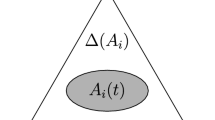Abstract
We consider online learning in repeated decision problems, within the framework of a repeated game against an arbitrary opponent. For repeated matrix games, well known results establish the existence of no-regret strategies; such strategies secure a long-term average payoff that comes close to the maximal payoff that could be obtained, in hindsight, by playing any fixed action against the observed actions of the opponent. In the present paper we consider the extended model where the duration of each stage of the game may depend on the actions of both players, while the performance measure of interest is the average payoff per unit time. We start the analysis of online learning in repeated games with variable stage duration by showing that no-regret strategies, in the above sense, do not exist in general. Consequently, we consider two classes of adaptive strategies, one based on Blackwell’s approachability theorem and the other on calibrated forecasts, and examine their performance guarantees. In either case we show that the long-term average payoff is higher than a certain function of the empirical distribution of the opponent’s actions, and in particular is strictly higher than the minimax value of the repeated game whenever that empirical distribution deviates from a minimax strategy in the stage game.
Preview
Unable to display preview. Download preview PDF.
Similar content being viewed by others
References
Auer, P., Cesa-Bianchi, N., Freund, Y., Schapire, R.E.: The nonstochastic multiarmed bandit problem. SIAM J. Comput. 32(1), 48–77 (2002)
Blackwell, D.: An analog of the minimax theorem for vector payoffs. Pacific J. Math. 6(1), 1–8 (1956)
Blackwell, D.: Controlled random walks. In: Proc. Int. Congress of Mathematicians 1954, vol. 3, pp. 336–338. North Holland, Amsterdam (1956)
Boyd, S., Vanderberghe, L.: Convex Optimization. Cambridge University Press, Cambridge (2004)
Cesa-Bianchi, N., Lugosi, G.: Prediction, Learning, and Games. Cambridge University Press, New York (2006)
Foster, D.P., Vohra, R.: Regret in the on-line decision problem. Games and Economic Behavior 29, 7–35 (1999)
Foster, D.P., Vohra, R.V.: Calibrated learning and correlated equilibrium. Games and Economic Behavior 21, 40–55 (1997)
Foster, D.P., Vohra, R.V.: Asymptotic calibration. Biometrika 85, 379–390 (1998)
Freund, Y., Schapire, R.E.: Adaptive game playing using multiplicative weights. Games and Economic Behavior 29, 79–103 (1999)
Fudenberg, D., Levine, D.: Universal consistency and cautious fictitious play. Journal of Economic Dynamic and Control 19, 1065–1990 (1995)
Fudenberg, D., Levine, D.: An easier way to calibrate. Games and Economic Behavior 29, 131–137 (1999)
Hannan, J.: Approximation to Bayes Risk in Repeated Play. Contribution to The Theory of Games, vol. III, pp. 97–139. Princeton University Press, Princeton (1957)
Kakade, S.M., Foster, D.P.: Deterministic calibration and nash equilibrium. In: Shawe-Taylor, J., Singer, Y. (eds.) COLT 2004. LNCS (LNAI), vol. 3120, pp. 33–48. Springer, Heidelberg (2004)
Lal, A.A., Sinha, S.: Zero-sum two-person semi-Markov games. J. Appl. Prob. 29, 56–72 (1992)
Mannor, S., Shimkin, N.: The empirical Bayes envelope and regret minimization in competitive Markov decision processes. Mathematics of Operations Research 28(2), 327–345 (2003)
Mannor, S., Shimkin, N.: Regret minimization in repeated matrix games with variable stage duration. Technical Report EE-1524, Faculty of Electrical Engineering, Technion (February 2006)
Author information
Authors and Affiliations
Editor information
Editors and Affiliations
Rights and permissions
Copyright information
© 2006 Springer-Verlag Berlin Heidelberg
About this paper
Cite this paper
Mannor, S., Shimkin, N. (2006). Online Learning with Variable Stage Duration. In: Lugosi, G., Simon, H.U. (eds) Learning Theory. COLT 2006. Lecture Notes in Computer Science(), vol 4005. Springer, Berlin, Heidelberg. https://doi.org/10.1007/11776420_31
Download citation
DOI: https://doi.org/10.1007/11776420_31
Publisher Name: Springer, Berlin, Heidelberg
Print ISBN: 978-3-540-35294-5
Online ISBN: 978-3-540-35296-9
eBook Packages: Computer ScienceComputer Science (R0)




